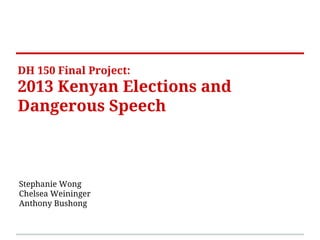
2013 Kenyan Elections Social Media
- 1. DH 150 Final Project: 2013 Kenyan Elections and Dangerous Speech Stephanie Wong Chelsea Weininger Anthony Bushong
- 2. What is Dangerous Speech? ● Impassioned sender ● Ethos based, potentially inaccurate statements ● With the intent of mobilizing violence ● Typically revolving around polarizing issues with a volatile audience ● More relevant now than ever with social media increasing immediacy of publication and breadth of audience
- 3. Why Kenya? ● 2007 Presidential Election ● Raila Odinga loses to Mwai Kibaki ● Organized rallies develop into protests ● Protests give way to riots and violence, 1300 fall to the post-election chaos ● What did social media have to do with this? With its growing popularity, will it have more of an effect in 2013?
- 4. How will Social Media affect Kenya? ● In 2007-08, mobile access was costly ● Twitter and Facebook more accessible now ● Will social media propagate violence? Will it be easier to mobilize people for riots and protests? ● Or will it foster more peaceable discussions? Will it provide an outlet to dispel such violent reactions? ● Provides a live social experiment to witness as it happens
- 5. Kenya's preemptive actions ● The Umati Project ○ First of its kind ● Kenyan government monitoring for dangerous speech ○ National Steering Committee on Media Monitoring ● Defining success: Will they be successful if they stop dangerous speech, or if they change the way social media is used?
- 6. Our Project and Hypothesis ● Monitoring tweets in different key locations during the election results and post-election results ● Searching for hashtags and text involving dangerous speech, comparing it with tweets involving peace ● How do the results of these queries correlate with the actions of the people? ● Hypothesis: Based off of the violence in 2007, we believe that there will be more tweets partaking in hate and dangerous speech than tweets regarding peace talks.
- 7. Methods ● Looked at Tweets by location ● All tweets produced by users in Kenya and a bit of surrounding areas ● Looked solely at tweets with popular hashtag #KenyaDecides ● Started recording during last hour that polls were still open at 9pm March 4th ● Continued recording until day after election results released on March 11th
- 8. Methods ● Data carried over to MySQL ● Queries included: ○ searching by words like "riot" and "peace" ○ users ○ location
- 10. Data
- 16. RESULTS so far ● In contrast to the 2007 elections, this election has been peaceful so far ● The word "peace" has been tweeted more than any other "dangerous speech" ● Avoiding a repeat of the past ● Uhuru Kenyatta won the election, as announced on Monday March 11th ● Controversy from the announcement leads to small amounts of violence
- 17. Visualization ● Polarity of most used words in tweets ● Word cloud to discover which words to test ● Gephi focus on those words
- 18. Word Cloud
- 19. What this means... ● Popular words include: ○ odinga ○ uhuru ○ mudavadi ○ spoilt/rejected ○ results, votes, win ○ peace ○ blackout ○ wazi campaign ● Strong signs of peaceful communication ● Blackout = monitoring hate speech or offensive images in media ● Wazi campaign = nationwide public awareness campaign that uses 3D animation to convey messages of peace and good governance
- 21. What we are taking away from this ● Taking part in an event of worldwide importance as it is happening ● Educating ourselves on the political system and culture in Kenya ● Social media can facilitate peace as easily as it can violence